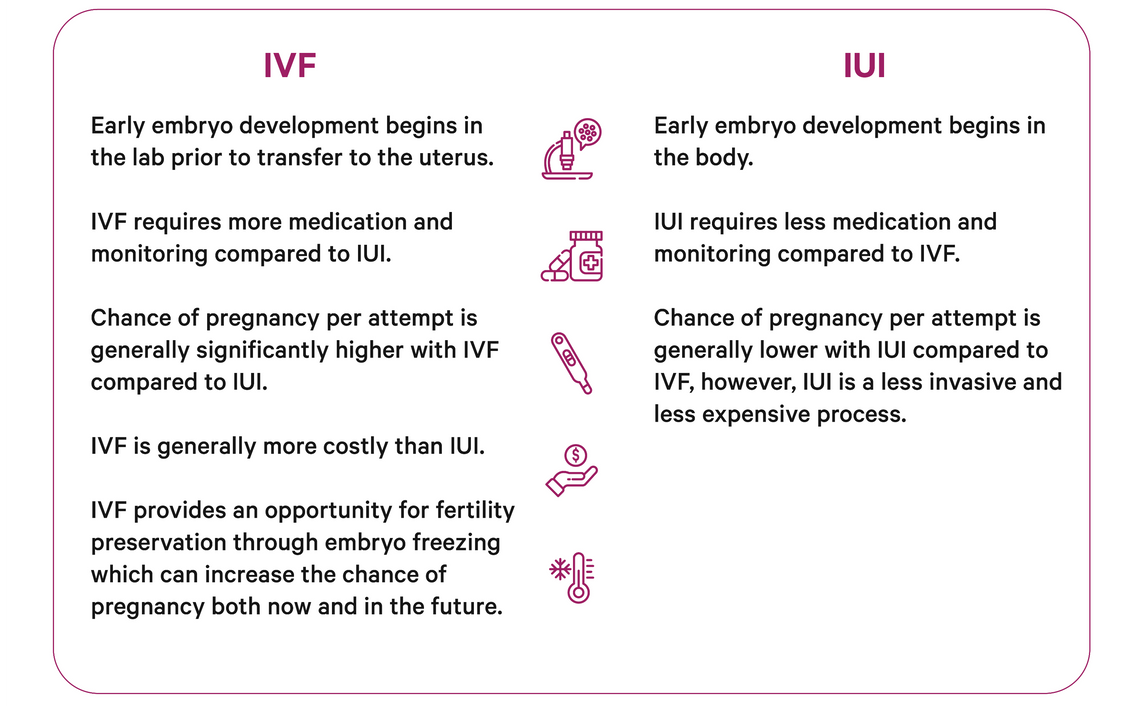IVF vs IUI, And Other Treatments
If you’re exploring your fertility options, you’ve likely come across two terms: IVF and IUI. Both are evidence-based treatment options to help you conceive, but how do they differ and how do you know which options is right for you? Find out more below and get expert perspectives from Generation Fertility Specialist, Dr. David Gurau.
What is IVF and IUI?
IVF and IUI are common fertility treatments that increase the chance of pregnancy.
IVF stands for in vitro fertilization. In general, IVF involves the following 5 steps.
Ovarian stimulation – medication is used for ovarian stimulation with the intention of allowing multiple high quality mature eggs to grow.
Egg / oocyte retrieval – a minor procedure is performed to access the eggs from the ovaries.
Fertilization – fertilization procedures are performed in the laboratory with the intention of maximizing each egg’s chance of fertilization with sperm.
Early embryo development – early embryo development is monitored closely in a controlled environment with the intention of maximizing the chance of producing good quality embryos.
Embryo freezing, embryo genetic testing, and fresh or frozen embryo transfer into the uterus – each person’s situation is unique; however, the final goal of IVF is transferring an embryo into the uterus to allow successful implantation and pregnancy.
IUI stands for intrauterine insemination.
Although some individuals may refer to this as ‘artificial insemination’, the correct term is IUI, as the goal remains natural conception. IUI can be performed in an unstimulated cycle (natural cycle + IUI) or a medicated cycle (ovarian stimulation + IUI). The goal of IUI is to maximize the likelihood of natural conception by ensuring that a high concentration of motile sperm are located in the Fallopian tubes at the time of ovulation. Achieving this goal requires monitoring of the menstrual cycle and a minor procedure during which a sperm sample is placed inside the uterus. Placing sperm inside the uterus requires a laboratory procedure called sperm preparation, commonly referred to as ‘sperm wash’. Sperm preparation involves separating motile sperm cells from ejaculated semen so that a highly concentrated sample of motile sperm can be used for IUI.
The goal of IUI is allowing natural fertilization, successful implantation, and pregnancy.
What are the main differences between IVF and IUI?
Each person's situation is unique. Deciding between IVF and IUI should be done in consultation with your fertility specialist. It is important to review your own situation and ask the questions that you need to review the pros and cons and risks and benefits of each option.


The chance of success with IUI and IVF is dependent on multiple factors. Assessing prognosis is an important part of determining which treatment option is right for you – this should be part of your discussion with your fertility specialist. [Bahadur 2020, p1A]

Are there reasons a doctor would recommend IVF over IUI?
After conducting a thorough assessment of your health and reproductive goals, your fertility specialist will provide you with the information that you need to decide which options are right for you. According to Dr. Gurau:
“Each person’s situation is unique. We are committed to providing the highest quality reproductive care. We take time carefully reviewing all results and answering all questions so that individuals are empowered to make informed choices about their care. We provide information and guidance, working together so that people can choose the treatment that is right for them with a focus on achieving their reproductive goals.”
Dr. David Gurau, MD, FRCSC, GREI
Are there other fertility treatments available?
Yes, there is a wide range of fertility treatment options available aside from IVF and IUI. Finding the treatment that is right for you starts with a consultation with a fertility specialist and a careful review of your specific situation. Some other treatment options include:
Ovulation induction
Timed intercourse
Optimizing natural fertility
Third-party reciprocal reproduction solutions such as egg donor, sperm donor, embryo donor, gestational surrogacy, reciprocal IVF
Fertility preservation such as egg or sperm freezing
Dr. Gurau reassures patients that all journeys to parenthood are unique and there is no ‘one-size fits all’ treatment plan. At Generation Fertility, our priority is to give you the best possible chance of achieving your family goals – with support and care every step of the way.
If you're interested in a consultation to learn more about your fertility options, speak with one of our Fertility Specialists today. No referral required.
Reference
1. Bahadur G, et al. Observational retrospective study of UK national success, risks and costs for 319,105 IVF/ICSI and 30,669 IUI treatment cycles. BMJ Open. 2020; e034566. doi: 10.1136/bmjopen-2019-034566


